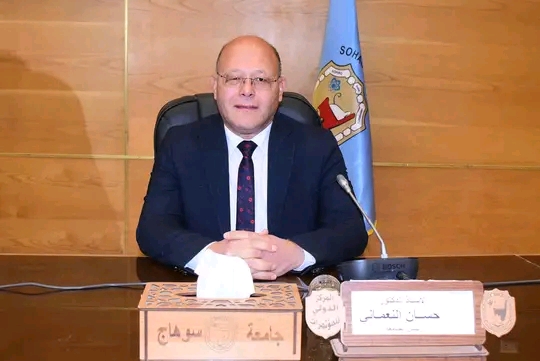Dr. Hassan Al-Numani, President of Sohag University, attended the educational seminar organized by the university for its students under the title “Artificial Intelligence, the Internet of Things, and Risks.” The seminar was delivered by Dr. Mohamed Behairy, Lecturer at the Faculty of Artificial Intelligence at the Russian University, in the presence of Dr. Abdel Nasser Yousif, Vice President of the University for Education and Student Affairs; Dr. Al-Nemiri Khalaf, Dean of the Faculty of Computers and Artificial Intelligence; Colonel Mohamed Kamal, Director of the Hayah Karima Foundation in Sohag; along with a number of faculty members, staff, and students. The event was held at the International Conference Center on the university’s new campus.
Dr. Al-Numani emphasized that the university is keen on organizing educational seminars for students that address the latest technological and scientific developments. He explained that artificial intelligence (AI) is one of the most important technological advancements of the 21st century, describing it as a revolutionary technology capable of transforming many aspects of life. Therefore, it is essential to understand its importance, advantages, and limitations, especially since AI is no longer a distant concept but a present reality that influences our decisions, drives innovation, and helps solve challenges once thought impossible. He expressed his gratitude to Dr. Mohamed Behairy for his participation and for delivering such a valuable and timely lecture to help students keep up with the rapid advances in this field.
During the seminar, Dr. Mohamed Behairy explained that artificial intelligence has become a central tool integrated into nearly all sectors, becoming an inseparable part of daily life. He discussed the definition, origin, and stages of AI development, highlighting its advantages, disadvantages, and its impact on various work fields. He also illustrated how AI contributes to improving efficiency, precision, and performance with its vast capabilities. However, he noted that despite its great potential, AI can only simulate certain aspects of human intelligence and still lacks human awareness and emotions, such as intuition, creativity, and emotional understanding—qualities unique to humans.
He called on students to be active and enlightened participants in the modern world and to study AI deeply, as it serves as a catalyst for innovation that generates ideas and applications once considered science fiction—provided that technology is used in ways that enhance societal well-being and respect human values.
At the end of the seminar, a discussion session was held, during which students’ questions about the future of AI and the latest developments in the field were answered.

